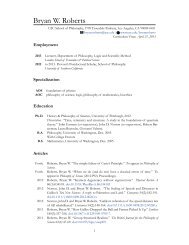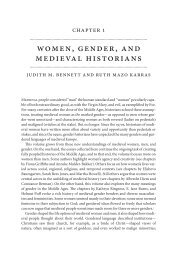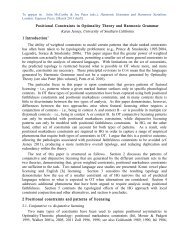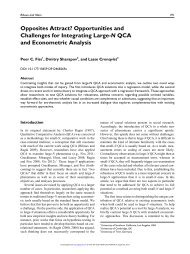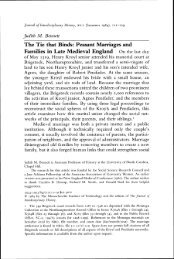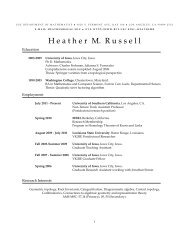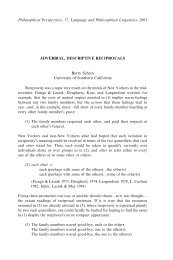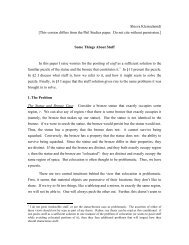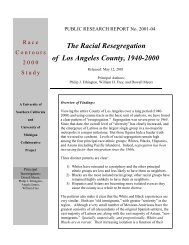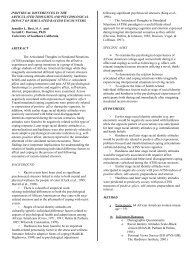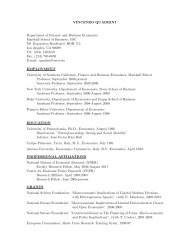The Diffusion of Ideas over Contested Terrain - Personal World Wide ...
The Diffusion of Ideas over Contested Terrain - Personal World Wide ...
The Diffusion of Ideas over Contested Terrain - Personal World Wide ...
You also want an ePaper? Increase the reach of your titles
YUMPU automatically turns print PDFs into web optimized ePapers that Google loves.
#2144-ASQ V49 N4-December 2005—file: 49401-fiss<br />
international capital markets (e.g., Useem, 1996; Rubach and<br />
Sebora, 1998). Hansmann and Kraakman (2001) contended<br />
that corporations that adopt a shareholder-oriented g<strong>over</strong>nance<br />
approach will enjoy access to capital at a lower cost,<br />
providing them with a competitive advantage <strong>over</strong> those nonadopting<br />
firms. Similarly, C<strong>of</strong>fee (1999) suggested that global<br />
convergence will emerge “through the back door,” where<br />
foreign firms seeking to list on U.S. stock exchanges will voluntarily<br />
adopt shareholder-oriented g<strong>over</strong>nance practices in<br />
order to gain access to American investors.<br />
Some researchers have also suggested that growing convergence<br />
is due to product market pressures (Hansmann and<br />
Kraakman, 2001; Höpner, 2001; Khanna and Palepu, 2001).<br />
Firms following a shareholder value model may have a competitive<br />
advantage in product markets because their g<strong>over</strong>nance<br />
structure allows them to adapt more rapidly to a<br />
changing environment. Unencumbered by other stakeholder<br />
interests, such corporations may have superior capabilities in<br />
reorganizing their management structures, allowing them to<br />
enter new product markets aggressively or to abandon inefficient<br />
investments more rapidly. Product-market competition<br />
is also seen as driving convergence through social learning,<br />
because international product market rivalry brings other<br />
firms in direct contact with firms adhering to a shareholderoriented<br />
approach (Hansmann and Kraakman, 2001).<br />
Rather than joining the debate as to whether new convergence<br />
or old diversity in g<strong>over</strong>nance systems is the more<br />
likely international scenario in the future, we propose instead<br />
to contribute to a greater understanding <strong>of</strong> the diffusion <strong>of</strong><br />
g<strong>over</strong>nance models by going beyond existing explanations<br />
that focus on financial or product-market pressures. Fundamentally,<br />
g<strong>over</strong>nance models such as shareholder value management<br />
are normative belief structures about the allocation<br />
<strong>of</strong> power in the firm. Such a view is consistent with a large<br />
body <strong>of</strong> research suggesting that corporate control is political<br />
(e.g., Cyert and March, 1963; Davis and Thompson, 1994;<br />
Westphal and Zajac, 1994; Ocasio and Kim, 1999; Fligstein,<br />
1990, 2001). As a belief structure—rather than simply a single<br />
technique or practice—additional political, social, and psychological<br />
factors are likely to play a role in explaining the diffusion<br />
process (Strang and Soule, 1998; Westphal and Zajac,<br />
2001).<br />
Here, we develop a theoretical explanation that gives much<br />
closer attention to the macro and micro sociopolitical aspects<br />
<strong>of</strong> the diffusion process, using the empirical context <strong>of</strong> the<br />
spread <strong>of</strong> a shareholder value orientation among German<br />
firms, which has multiple theoretical and empirical benefits.<br />
First, it provides an opportunity to demonstrate the value <strong>of</strong> a<br />
detailed theoretical and empirical examination <strong>of</strong> shareholder<br />
heterogeneity (cf. Palmer and Barber, 2001). Most research in<br />
financial economics tends to treat corporate owners as a<br />
homogeneous group with a singular interest on maximizing<br />
shareholder value (Bagwell, 1991). In contrast, we use the<br />
German context to show that when owners are banks, firms,<br />
g<strong>over</strong>nments, and families—the major ownership groups in<br />
German corporations—the cross-currents <strong>of</strong> divergent<br />
sociopolitical interests among and within ownership groups<br />
502/ASQ, December 2004



